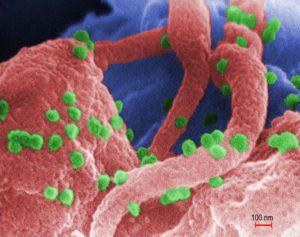
T cell (red) infected with HIV particles (yellow) (Public Health Image Library, CDC, Image ID:10000)
Broadly neutralizing antibodies are of great importance to the HIV vaccine field. Many scientists believe that the elicitation of these antibodies may protect against the acquisition of various strains of the virus. However, one of the problems with many broadly neutralizing antibodies towards HIV is that they are heavily mutated as they undergo a great deal of affinity maturation to increase their breadth. Researchers, led by William Schief, have made two types of broadly neutralizing antibodies which have much less mutations and other rare features but maintain breadth and other desirable characteristics.
Broadly neutralizing antibodies which target the HIV Envelope usually have very rare characteristics. For example, some of these antibodies are highly mutated, polyreactive, contain indels and have unusually long complementarity-determining regions. One such example is VRC01, a very broad and potent antibody that targets the CD4-binding site. As very few HIV-infected individuals make VRC01-like antibodies, it is expected that they will be difficult to elicit after vaccination. Therefore, the researchers developed two VRC01-like antibodies with less mutations than the parent antibody. One of these antibodies had more usual antibody characteristics which were in line with antibodies usually elicited after vaccination.
The researchers found that one of their engineered antibodies lacked the polyreactivity that is observed with some broadly neutralizing antibodies. This antibody was also favourably comparable to a panel of anti-HIV broadly neutralizing antibodies. The researchers then investigated what minimal mutations were needed for breadth. From this information they developed a immunization regime to elicit these types of antibodies.
The authors went on to try and further understand how CD4-binding site antibodies bind. To do this, they crystallized an HIV trimer in complex with a portion of a CD4-binding site antibody. They found that binding to this region is very glycan-dependent, with interactions with glycans in more than one Envelope promoter.
These researchers have shown that antibodies do not need to be highly mutated in order to be broad. This makes HIV vaccine development a more achievable goal as antibodies that are easier to elicit may be just as effective as highly mutated broadly neutralizing antibodies.
Journal Article: Jardine et al., 2016. Minimally Mutated HIV-1 Broadly Neutralizing Antibodies to Guide Reductionist Vaccine Design. PlosPathogens
Article by Thandeka Moyo











